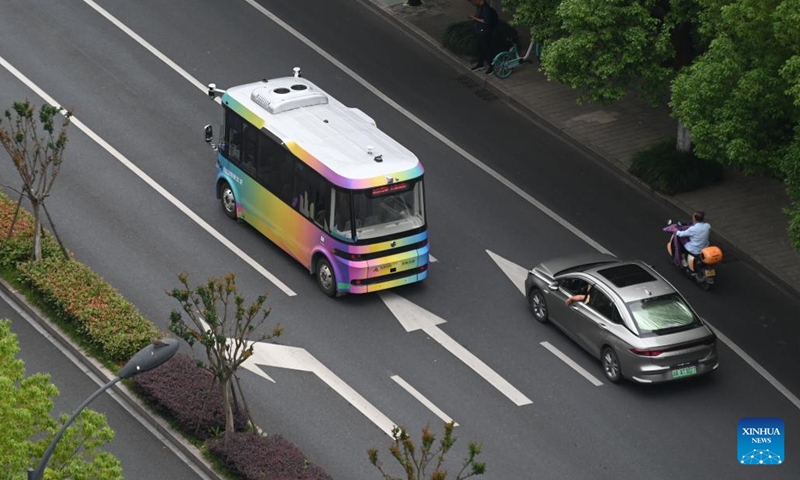
An autonomous driving minibus runs on a road in Yuhang District, Hangzhou City, east China's Zhejiang Province, May 22, 2024. The autonomous driving bus route in Yuhang District is the first one of its kind powered by vehicle-road coordination technology in Hangzhou. This 5-kilometer bus line winds through schools, industrial parks, residential compounds and subway stations, free of charge for all citizens. Photo: Xinhua
Shanghai is set to begin public testing of autonomous cars as early as next week, offering free rides for residents throughout the trial period, marking a significant step forward in China's intelligent transportation.
"The active application and testing of autonomous vehicles in Shanghai facilitate the effective deployment of autonomous driving technology in China, promoting China's future societal development," Cui Dongshu, secretary general of the China Passenger Car Association CPCA told the Global Times on Tuesday.
Authorized companies participating in the tests said that the first batch of five vehicles will be involved in the public trial, with more new cars and new models to be added in the future.
The test process will be closely monitored, and each car will be equipped with a safety officer. Insiders revealed that autonomous cars operating in the test will also be backed by remote control and cybersecurity personnel to address operational issues.
Data obtained during the tests will be collected to assess the efficiency, safety, and reliability of the autonomous vehicles.
Insiders said that the autonomous cars' performance and operational adjustments will be made based on the actual test results, and feedback from participants will be crucial in refining the technology and addressing any issues that arise during the testing phase.
"Shanghai's testing project in the field of autonomous cars sets a national example in China," Cui said. He that such demonstration projects help China rapidly seize the initiative in the global autonomous driving sector.
"Autonomous vehicles now operate safely in more than 90 percent of urban scenarios, making them significantly safer than novice human drivers," SAIC Motor, one of the authorized companies said.
Cui said that Shanghai's move towards public testing of driverless cars underscores China's ambitious goals in the realm of autonomous driving and intelligent transportation.
In recent days, Beijing and Wuhan city in Central China's Hubei Province, successively completed autonomous vehicle testing projects, boosting the development of China's intelligent transportation.
As of July 8, Beijing has 116 autonomous test vehicles logging nearly 2 million kilometres, Xinhua reported on July 8.
Wuhan, China's largest operational region for Apollo-Go Robotaxi, a China-based autonomous ride-hailing platform, has more than r 500 autonomous cars running on the streets, which will be expanded to 1,000 by the end of 2024.
Cui said that China's proactive approach set a precedent for future developments in the international autonomous driving industry, noting that the country's robust social security, expansive testing area, and ideal testing environment will ensure safe and controlled testing scenarios, Cui added.




